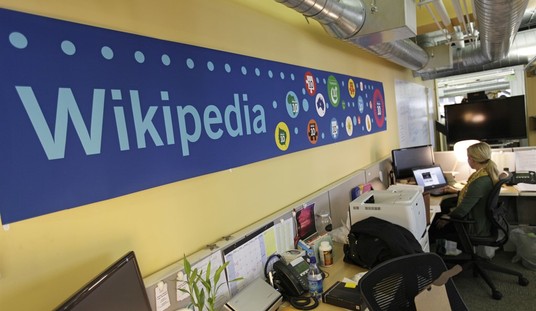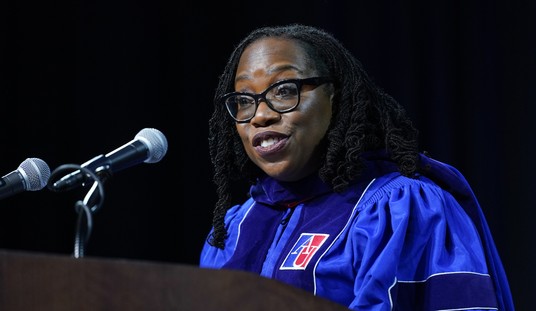Greg Sargent scores an interview with Arianna Huffington, who got $315 million in a sale of Huffington Post to AOL as well as complete control of AOL’s content. She has plans for that power, Sargent reports at the Washington Post. She hopes to turn AOL into a center of “citizen journalism” in advance of the 2012 elections:
Arianna Huffington is planning to use AOL’s infrastructure to launch a major expansion of citizen journalism in advance of the 2012 presidential campaign, she tells me in an interview, sharing new details about her vision of expanded political coverage in the wake of the merger with AOL.
Huffington described her plan as “Jeffersonian,” and she says she plans to use AOL’s Web site Patch.com, a network of sites that cover local news at the granular level, as a vehicle for expansion modeled on HuffingtonPost’s 2008 “Off the Bus” coverage. “Off the Bus” made a splash when candidate Barack Obama was caught on tape suggesting that economically distressed voters are “bitter” and “cling to guns or religion,” and if Huffington has her way, she will oversee a massive increase in such coverage next year.
“We are going to dramatically accelerate this in 2012,” said Huffington, who discussed the idea on a conference call yesterday with Patch.com employees. “We will have thousands and thousands of people covering the election. Covering the Repulicans. Covering the Democrats. Just being transparent about it.”
Howard Kurtz reports that the HuffPo’s readers aren’t terribly thrilled with the corporate buyout:
Within hours after the merger was announced, Huffington Post readers had even made a game of one-upping each other with metaphors that conveyed the depth of their despair about the sale. “This feels like walking into my credit union only to find out it was bought by Bank of America,” one said. “[It’s] like Carol Channing taking over for Fergie in the Black Eyed Peas. Legendary, but past the expiration date by about 10 years,” another lamented. A user with the tech analogy might have been the closest to the broader sentiment: “It’s like Friendster buying Facebook.”
Readers were concerned about what they almost unanimously perceive to be AOL’s conservative bias (the deeply political undercurrent of the comments raises the question of whether The Huffington Post might have a Silent Majority too cowed to post). But some expressed faith in Arianna Huffington to continue to represent liberal values. “She’s proven herself to be a defender of progressive thought and her work in that realm gives her all of the capital [she deserves] to move this site in the direction that she deems best,” one wrote. Others were even optimistic that the AOL partnership might expand the site’s reach: “Maybe a long shot, but still, with the promise of more local areas reached, HuffPost will enter some of these red enclaves and bring a little blue in there.” One commenter said they hoped AOL might fund more investigative journalism.
“Funding” investigative journalism is probably not in the cards for a couple of reasons. First, Kurtz briefly notes the controversy over the Huffington Post’s economic model of getting most of their content for free, paying only a few writers, mostly celebrities, for their content. The push for “citizen journalists” sounds like more of the same. That can’t please the current roster of paid journalists at AOL’s Politics Daily, whose value at the remade AOL will drop rapidly as free content floods the site.
In fact, less than two years ago, Politics Daily dumped most of its blog-friendly writers in a shake-up designed to create a professional, balanced image for AOL content. Politics Daily editor Melinda Henneberger told me at that time that AOL wanted to present a solid journalistic tone, and that it had hired established journalists for that purpose:
Henneberger wants AOL-PD to reflect “traditional journalistic values” and “absolutely” a traditional journalistic model. This isn’t ideological; she wants opinions, when they get published, are “well supported, well written” and worked through the editorial model. There are “a million places” where you can get the alternative, but she wants a “respectful” dialogue. They want a news/opinion magazine, not a blog, in the same model as Newsweek or Time, but built for the on-line audience rather than just as the website for a print-directed periodical.
AOL will be launching more of these on-line sites; they want to be the new model for journalism. Henneberger called it a “preservation society”, half-joking. They will be sending a reporter to Afghanistan to cover the war, and AOL wants to establish itself as a vanguard of the new economic model for the traditional journalistic model. Staffers have to commit to the traditional journalistic model and practices to be a part of AOL-PD, Henneberger says, in order to build their credibility as the next iteration of journalism.
Huffington has signaled that the journalistic paradigm is now essentially dead at AOL — and at least some of the journalists there are not happy at all to see it. Some resentment has been expressed at falling under the editorial control of a political activist rather than a traditional editor, according to one source close to the situation. The fear among the current stable is that Arianna Huffington will transform AOL into a base for her political activism, and that fear is not limited to the center-right writers currently employed there. Matt Lewis has already left for the Daily Caller and wrote his valediction at Politics Daily, expressing his discomfort at the U-turn taken by AOL:
PD remains a unique place on the Web, where diverse and often nuanced opinions are welcomed and encouraged — and where civil debate over incredibly serious (and occasionally trivial) political ideas and news takes place on a daily basis.
But while I have loved my tenure at PD, recent news that AOL had acquired The Huffington Post — and that Arianna Huffington would become editor in chief of many AOL sites — alarmed me.
I’ve met Ms. Huffington exactly once — on the set of “Nightline’s” election night coverage. She could not have been kinder. Additionally, I have even authored an article or two for her site (on tech issues) over the years. This is all to say that I have no personal issue with Ms. Huffington, and that I am not a “Huff-hater.”
However, writing a guest post is different from working for someone, and it occurs to me that AOL has vastly underestimated the public perception (I would argue the accurate impression) that Huffington is a far-left liberal.
Obviously, I am more than happy to write for a mainstream news outlet where differing opinions are allowed to flourish, but I am less comfortable with the notion of being permanently affiliated with an overtly left-of-center (sometimes activist) outlet.
Secondly, there probably won’t be much cash left for funding any journalism projects. The size of the buyout will come close to tapping out any AOL capital that could possibly be used for such a purpose. Normally, buyouts are predicated on a multiple of revenue that goes from 36 to 60 months, or from eight to twelve times annual earnings (profit rather than revenue) for Internet properties. Reuters wondered about the financials of this deal:
The move, announced Monday, comes at a hefty premium. AOL is estimated to be paying 32 times earnings before interest, taxes, depreciation and amortization for The Huffington Post, said Benchmark Co analyst Clayton Moran.
Similar content deals, such as Hellman & Friedman’s acquisition of Internet Brands in September 2010, typically go for eight to 12 times earnings, said Moran.
“AOL just spent 40 percent of their cash for very little near-term return,” said Moran.
AOL expects Huffington Post to generate around $10 million in profit before interest and taxes and see savings of around $20 million meaning it would be valued at around 10 times 2011 profits.
That would assume that revenue at HuffPo was somewhere close to $60 million a year or profits consistently at $25 million, both of which are possible but seem high, especially since HuffPo announced last year that it finally entered into an operational profit after several years in the red. It will take AOL a long time to recoup this expenditure, and even longer if they can’t significantly add to their readership. However, they can add to their profitability — by adding thousands of writers to contribute content for free, with thousands of new pages a year on which to sell ads.
AOL investors appear to share this skepticism about the venture. As of this afternoon, AOL was trading near its 52-week low; it has dropped more than three dollars a share from a month-long high on January 27th, and down more than a dollar and a half since the HuffPo announcement early yesterday. With its market capitalization dropping — now down to $2.2 billion, just seven times what Huffington got paid for the merger — money will be tight around the office for a very long time.








Join the conversation as a VIP Member